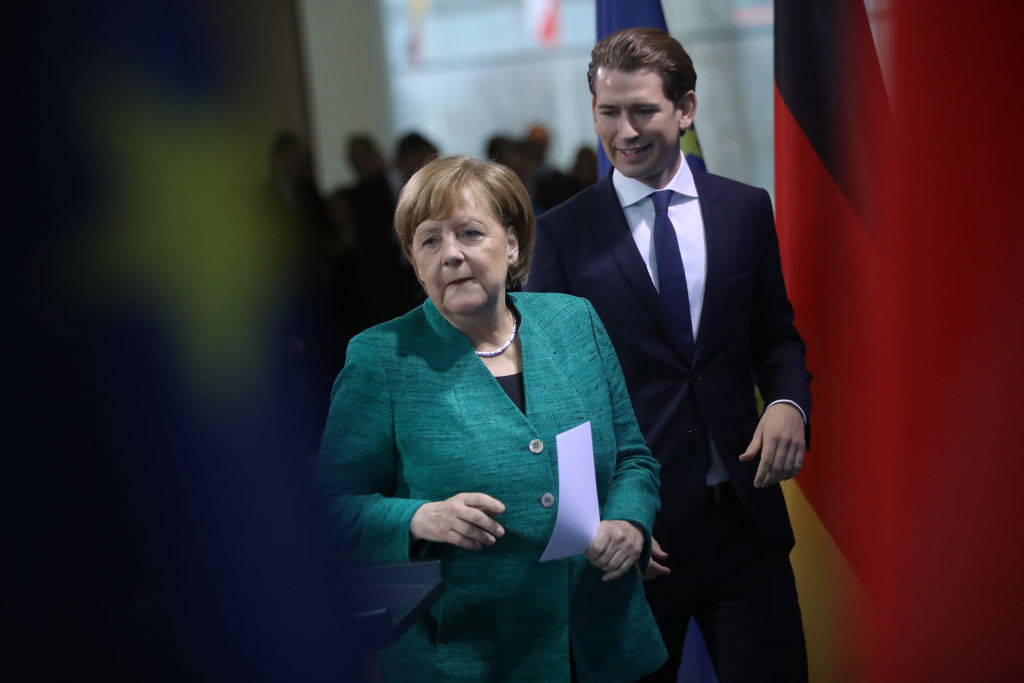Who is the most important politician in Germany? Angela Merkel? No, it’s the Austrian Chancellor, Sebastian Kurz. Merkel remains a colossus on the world stage, but domestically her power is much diminished. Meanwhile German eyes are on Kurz, the world’s youngest national leader, as he strives to bridge the gulf between centrists and populists – and between east and west.
Despite their vastly differing ages (Merkel is 63; Kurz is just 31), the German and Austrian Chancellors actually have quite a lot in common. They’re both leaders of centre right parties in prosperous Central European nations, where immigration is a growing concern, and the far right is on the rise. They both won pyrrhic victories in last year’s elections – each ending up as the leader of the largest party, each with insufficient votes or seats to govern alone.
However their reactions to this common problem could hardly be less alike. In Germany, Merkel has formed yet another so-called ‘grand coalition’ with the Social Democrats, keeping Germany’s hard right party, Alternative für Deutschland, out of office. In Austria, Kurz has shunned the Social Democrats and formed a coalition government with the hard right Freedom Party.
Kurz hopes the responsibilities of government will tame the Freedom Party. If he succeeds, this will have profound implications for Germany. It will show Christian Democrats they must build bridges with Germany’s populist right. And it will show that Merkel’s centrist strategy has surely had its day.
So far, Kurz’s gamble seems to be paying off. His centre right People’s Party has toughened up on immigration, while the hard right Freedom Party has confirmed its support for the EU. During last year’s election campaign, Freedom Party leader Heinz-Christian Strache called Kurz ‘an imposter’ on account of Kurz’s dramatic shift (some might say lurch) to the right. However now that he’s vice chancellor, Strache is minding his P’s and Q’s.
Kurz’s pronouncements on immigration are far subtler than Strache’s. ‘Islam is not part of Austria!’ said Strache. ‘We want to prevent the Islamisation of Austria!’ ‘We will do everything in our power to put an end to migrants’ abuse of social welfare,’ says Kurz. Yet although their styles are very different, they’re both receptive to Austrian fears about immigration and assimilation. What makes Kurz unique is his Nice Cop/Nasty Cop approach.
Kurz won his spurs as Minister for Integration, a new post in a new department. He introduced free German classes for Islamic leaders, and required migrant children to learn German before they started school. He led the drive to ban the burqa (which has now become law in Austria) and closed the migrant route through the Balkans into Austria and Germany. Uniquely among European politicians, he’s tough on Islamism and tough on the causes of Islamism. As he says, ‘Integration is a process of give and take.’
So when will Merkel follow Kurz’s example, and firm up her right wing? The answer is, she already has done – not by forming a new alliance with German populists (unlike the Freedom Party, AfD stand no chance of entering any government anytime soon), but by bolstering her age-old alliance with the CDU’s Bavarian sister party, the Christian Social Union (CSU).
Austrians and Germans are more closely linked than any other European peoples. They share a common language – they watch the same TV shows. Austria’s cultural capital, Salzburg, is only a few miles from the Bavarian border, and it’s in Bavaria that Kurz’s tough line on immigration is really hitting home. Bavaria was the main entry point for Merkel’s million migrants. They entered Bavaria from Austria. No wonder so many Bavarians voted AfD. This was deeply worrying for the CSU, who’ve been in partnership with Merkel’s Christian Democrats ever since the Second World War.
The CSU has always been more right wing than the CDU, but since Merkel took her CDU towards the centre, that gap has become too wide for comfort. Now Merkel is striving to close this gap, making CSU leader Horst Seehofer Interior Minister in her new government, with responsibility for integration. It’s up to him to see off AfD. Will he manage it? He has to. His survival, and Merkel’s, both depend on it. Seehofer must convince German voters that his CSU can restore the CDU’s conservative credentials. If not, Alternative für Deutschland could become as popular as Austria’s Freedom Party.
AfD and the Freedom Party may both be anti-immigration parties, but their histories are very different. AfD was founded to oppose the introduction of the Euro. Its founders were journalists and academics. Only in the last few years has it become an anti-immigration party. The Freedom Party was founded in the aftermath of the Second World War by former Nazis and Germanic nationalists (among others). This isn’t quite as shocking as it sounds. Naturally, a great many Austrians had been members of the Nazi party. For democracy to succeed in postwar Austria, they needed a new democratic party to go to.
A shared history of National Socialism is one of the many things Germany and Austria have in common. It’s one reason why Germans and Austrians generally prefer to play down the close connections between their two countries. Eighty years after Austria was subsumed into the Third Reich, the Anschluss remains a source of shameful embarrassment for both nations: shameful embarrassment for Germany, because it invaded Austria in an act of brutal aggression; shameful embarrassment for Austria because that invasion was welcomed by so many Austrians – many of whom went on to play leading roles in the Nazi regime. Yet despite this shared sense of shame, which prompts amnesia about this special relationship on both sides of the border, German and Austrian politics have often run in parallel. Since the war, Austria has generally followed the Bundesrepublik’s lead. Right now, it looks like the other way around.






Comments